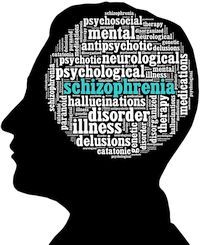Schizophrenia
Jul 15, 2019 • 1 view
Schizophrenia is a chronic and severe brain disorder that affects a person’s thoughts, feelings, and behaviours. This usually appears in late adolescence or early adulthood. It is characterized by delusions, hallucinations, feelings of fright and paranoia, trouble with thinking and concentration, lack of motivation and other cognitive difficulties. Schizophrenia can also be a lifelong struggle. Schizophrenia is often episodic, so periods of remission are ideal times for self-help strategies to limit the length and frequency of further future episodes. Schizophrenia affects only about 1 percent of the population.

Researchers believe that a number of genetic and environmental factors contribute to the cause. Life stressors may play a role in the disorder’s onset and course. As schizophrenia embraces several different disorders, variation in cause between cases is expected so cause behind individual cases have not yet been discovered by researchers.
SYMPTOMS
Symptoms of schizophrenia usually start between the age of 16 and 30. Rarely, children have schizophrenia.
The symptoms of schizophrenia fall into three categories: positive, negative and cognitive.
Positive symptoms:These symptoms are psychotic behaviours which are not generally seen in healthy people. People with positive symptoms lose touch with some aspects of reality. Symptoms include:
·Hallucinations and delusions
·Dysfunctional ways of thinking
·Agitated body movements
Negative symptoms:Negative symptoms are associated with disruptions of normal emotions and behaviours. Symptoms include:
·Reduced expression of emotions through facial expression or voice tone
·Reduced feelings of pleasure in everyday life.
·Difficulty with beginning and sustaining activities
Cognitive symptoms:For some patients, cognitive symptoms of schizophrenia are subtle, but for others, patients may notice changes in their memory or thinking. Symptoms include:
·Poor ability to understand information and use it to make decisions.
·Trouble focusing or paying attention.
·Problems with ability to use information immediately after learning it.
TREATMENT
For schizophrenia the most effective treatment involves a combination of medication, therapy, lifestyle changes and social support.
Most people with schizophrenia need to continue treatment even when they’re feeling better. Treatment can change over time.
Medication for scizophrenia works by reducing psychotic symptoms such as hallucinations, paranoia and disordered thinking. But it is not a cure for schizophrenia and is much less helpful for treating symptoms.
Therapycan help you improve your life skills, manage stress, address relationship issues and improve communication.
SELF HELP
You need to help yourself and the more you do so the less hopeless and helpless you will feel and this will help the doctor to reduce your medication.
